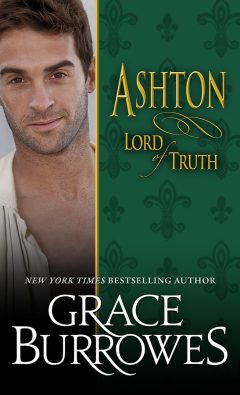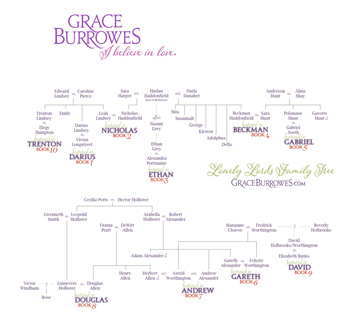Douglas
Lord of Heartache
Book 8 in the Lonely Lords series
Guinevere Hollister, cousin to the Marquis of Heathgate, has fashioned a life as a poor relation, raising her daughter Rose in rural obscurity and focusing her considerable passion and intellect on stewarding the estate they live on. Douglas Allen, Viscount Amery, is sent to Gwen by their mutual relations for lessons in husbandry of the land. As Douglas and Gwen find common ground, and then mutual pleasure, Gwen’s past rises up in the person of the powerful Duke of Moreland, who is bent on wresting control of Rose from her mother, even if that means Gwen must marry the Moreland heir.
Bonus Materials →
Enjoy An Excerpt







Chapter One
The child was small, helpless, and in harm’s way.
As Douglas Allen drew his horse to a halt, he absorbed more, equally disturbing facts:
The grooms clustered in the barn doorway would do nothing but mill about, moving their lips in silent prayer and looking sick with dread.
A woman—the child’s mother?—unnaturally pale at the foot of the huge oak in the stable yard, was also likely paralyzed with fear. The child, standing on a sturdy limb of the old tree, thirty feet above the ground, was as white-faced as her mother.
“Rose,” the woman said in a tight, stern voice, “you will come down this instant, do you hear me?”
“I don’t want to come down!” came a retort from the heights of the oak.
Douglas was no expert on children, but the girl looked to be about five years old. Though she stood on one limb, she also anchored herself to the tree with a fierce hold on the branch above her. When she made her rude reply, she stomped her foot, which caused the branch she grasped to shake as well.
Douglas heard the danger before he saw it. A low, insistent drone, one that would have been undetectable but for the stillness of the stable yard.
At Rose’s display of stubbornness, the woman’s hands closed into white-knuckled fists. “Rose,” she said, her voice an agony of controlled desperation, “if you cannot climb down, then you must hold very, very still until we can get you down.”
“But you promised I could stay up here as long as I wanted.”
Another stomp, followed by another ominous, angry droning.
Douglas took in two more facts: The child was unaware of the hornet’s nest hanging several yards out on the higher branch, and she was not at all unwilling to come down. She was unable. He recognized a desperate display of bravado when he saw one, having found himself in an adult version of the same futile posturing more than once in recent months.
He stripped off his gloves and stuffed them into the pocket of his riding jacket. Next, he shed his jacket, slung it across the horse’s withers, turned back his cuffs, and rode over to the base of the tree. After taking a moment to assess the possibilities, he used the height of the horse’s back to hoist himself into the lower limbs.
“Miss Rose,” he called out in the steady, no-nonsense voice his governess had used on him long ago, “you will do as your mother says and be still as a garden statue until I am able to reach you, do you understand? We will have no more rudeness”—Douglas continued to climb, branch by branch, toward the child—“you will not shout”—another several feet and he would be on the same level as she—“and you most assuredly will not be stamping your foot in an unladylike display of pique.”
The child raised her foot as if to stomp again. Douglas watched that little foot and knew a fleeting regret that his life would end now—regret and resentment.
But no relief. That was something.
The girl lowered her foot slowly and wrinkled her nose as she peered down at Douglas. “What’s peek?”
“Pique”—he secured his weight by wrapping one leg around a thick branch—“is the same thing as a taking, a pout, a ladylike version of a tantrum. Now come here, and we will get you out of this tree before your mama can devise a truly appalling punishment for your stubbornness.”
The child obeyed, crouching so he could catch her about the waist with both hands—which did occasion relief, immense relief. The droning momentarily increased as the girl left her perch.
“You are going to climb around me now,” Douglas instructed, “and affix yourself like a monkey to my back. You will hang on so tightly that I barely continue to breathe.”
Rose clambered around, assisted by Douglas’s secure grip on her person, and latched on to his back, her legs scissored around his torso.
“I wanted to come down,” she confided when she was comfortably settled, “but I’d never climbed this high before, and I could not look down enough to figure my way to the ground. My stomach got butterflies, you see. Thank you for helping me get down. Mama is very, very vexed with me.” She laid her cheek against Douglas’s nape and huffed out a sigh as he began to descend. “I was scared.”
Douglas was focused on his climbing—it had been ages since he’d been up a literal tree—but he was nearly in conversation with a small child, perhaps for the first time since he’d been a child.
Another unappealing aspect to an unappealing day.
“You might explain to your mama you were stuck,” he said as they approached the base of the tree. He slipped back onto the horse, nudged it over to where the woman stood watching him, and then swung out of the saddle, Rose still clinging to his back. He reached around and repositioned her on his hip.
“Madam, I believe I have something belonging to you.”
“Mama, I’m sorry. I was st-stuck.” The child’s courage failed her, and weeping ensued.
“Oh, Rose,” her mother cried quietly, and the woman was, plague take this day, also crying. She held out her arms to the child, but because Rose was still wrapped around Douglas, he stepped forward, thinking to hand Rose off to her mother. Rose instead hugged her mother from her perch on Douglas’s hip, bringing Douglas and the girl’s mother into a startling proximity.
The woman wrapped an arm around her child, the child kept two legs and an arm around Douglas, and Douglas, to keep himself, mother, and child from toppling into an undignified heap, put an arm around the mother’s shoulders. She, much to his shock, tucked in to his body, so he ended up holding both females as they became audibly lachrymose.
Douglas endured this strange embrace, assuring himself nobody cried forever. While he waited to extricate himself, several impressions came to him.
The first was of warmth. Douglas had forgotten a human embrace could be warm, and the crying woman was warm indeed. Her body heat radiated against his chest, bringing with it the second impression: fragrance. She smelled of soap and something spicy—lavender with rosemary, at least. The child, whose hair was tickling Douglas’s chin, smelled of the same soap and of the out-of-doors and of little-girl sweetness.
Douglas hadn’t known little girls had their own scent.
And the final impression, strongest of all, was a sense of pleasure his body took in being close to a warm, adult female, one well formed and unself-conscious of their proximity. Douglas didn’t censure himself for this realization—bodies would be bodies, after all—but neither did he allow himself to explore it.
With a sigh and possibly a final, small lean against his shoulder, the woman stepped back, leaving Rose anchored to Douglas’s chest.
“Sir, I cannot thank you enough. Will you introduce yourself?”
Now Rose was willing to hop down off his hip, but the girl disconcerted Douglas by taking his left hand and standing beside him. Mother and child wore the same expectant, teary expressions, and Douglas found himself unwilling to shake his hand loose of Rose’s. She had, after all, been through an upsetting business—and she was a child.
“Douglas Allen.” He bowed over the lady’s hand. “Viscount Amery, at your service.”
They were both bare-handed, so he dropped her fingers at the first acceptable moment, but not before he noticed even her hands were warm. Not hot, sweaty, or clammy, but warm.
“Miss Guinevere Hollister,” she replied, offering him a curtsy, then swabbing her handkerchief over Rose’s cheeks. “Will you come up to the house for tea, your lordship?”
“Tea would be appreciated.” He slung his jacket over his shoulder, his one hand still held captive by Rose. As they turned to walk toward the house, Miss Hollister aimed a glower at the stable boys standing in the door to the barn.
“For heaven’s sake, Ezra, take the viscount’s horse and see about that hornets’ nest when it is safe to do so.”
Douglas heard her ordering the stable help around, but was preoccupied with matching his stride to a small child’s.
“You could carry me,” Rose said, smiling up at him as if she’d divined his thoughts. She had dark hair in a riot of curls around a gamine face, and guileless green eyes.
“Rose.” Her mother’s tone portended a sharp rebuke.
Douglas swung the child back up to his hip. “We will have our tea that much sooner,” he pointed out. When the girl laid her head on his shoulder and sighed like a tired puppy, he wished he had not been so complicit with her schemes.
This child was the most… presuming person he’d met in recent memory. To his everlasting relief, when they gained the entry to the house, Rose was handed off to a footman with instructions that she be taken to her nurse, there to await her mother’s judgment.
Rose turned halfway up the stairs and waved at Douglas with the hand not clasped by the footman. Not knowing what else to do, Douglas offered the child a slight bow in response.
This exchange was not lost on the mother—Miss Hollister, as she’d so boldly introduced herself—but she withheld comment on a grown man who’d bow to a grinning, waving child.
“This way, if you please.” Miss Hollister led him down the hallway to a small parlor toward the back of the house. As she rang for tea, Douglas rolled down his cuffs, shrugged back into his jacket, and took in the appointments of the room.
The furnishings were more for comfort than elegance, this being in the way of a family parlor. A small blue velvet sofa was positioned under a window opposite the hearth, and two well-cushioned chairs with a low table of mellow blond oak between them sat along the inside wall. Before the hearth, but angled toward the center of the room, stood a sturdy oaken rocking chair.
Silence had fallen between Douglas and his hostess while he’d inspected the surroundings. She regarded him from her seat in one of the chairs, her expression politely curious.
“I invite you again,” she said, “to be seated. I’ve taken the liberty of ordering some sustenance with our tea, it being nigh to luncheon and you having ridden out from Town, unless I mistake the matter.”
Douglas took the other chair. “You do not. Mistake the matter, that is.”
A small, pained smile crossed Miss Hollister’s features, suggesting she would somehow rise to the challenge of exchanging pleasantries with a man who regarded small talk with as much affection as he did epidemics of influenza.
“While I know our families are connected,” she began, “I am at a loss as to why you would honor me with a call, not, of course, that you are unwelcome.”
She looked down at her hands. Douglas feared she was blinking back more tears, contemplating the morning’s outcome had he not come to call.
“Miss Hollister, the child is safe, and I have no doubt one of the grooms would have been up that tree had I not happened along. You must not dwell on the miseries that could have befallen you.”
Ignoring the miseries that had befallen one could also be useful, though Douglas kept that observation to himself. His hostess offered him a genuine smile for his assurances—false assurances though they were—then rose to accept the tea tray from a parlor maid.
While Miss Hollister fixed the tea, Douglas recovered from that smile, from the sheer, dazzling surprise of it.
His first impression of her had been one of plainness. Her features had been pinched with desperate concern; then she had been crying in relief. As he studied her over the tea service, he surmised that she sought to minimize her feminine attributes.
Her hair, a rich, glossy chestnut, was scraped back in a severe bun. She wore a mud-brown dress, one without a single bow or ruffle. Her attire did the job of decently covering her with a vengeance, the collar coming up to her neck, the sleeves covering her wrists. But she couldn’t hide a pair of wide, slanting green eyes, high cheekbones, or a generous, even lush mouth.
Nor could she entirely disguise an amply endowed female figure, though from the cut of her clothing, she tried to.
“How do you take your tea, my lord?”
Her voice was as subtly lovely as the rest of her, a soothing contralto, though her hands had the slightest tremor as she maneuvered around the porcelain tea service. The teapot sported cabbage roses, all pink petals and soft greenery.
She did not strike Douglas as a silver-tea-service sort of woman, which was appealing to a man who’d sold all but one set of good silver.
“Strong, three sugars, no cream.” A silence followed, one he knew he ought to fill with… words. Or something.
“Are you always such a serious fellow?”
“I have much to be serious about,” he replied, taking the tea from her. Their fingers brushed, and a faint blush crept up the lady’s graceful neck. How odd, that a woman in her position would blush so easily.
“You have me at a loss here,” Miss Hollister replied, busying herself with her tea. “While you are former brother-in-law to my cousin’s wife—do I have that right?—I am not familiar with your… specific situation. May I offer you a sandwich?”
She offered him two, heartily stacked with beef and cheddar, as if she knew the hours since breakfast for Douglas had been long and busy. He dragged his attention from the food and his plate—he even spotted a dab of mustard on the bread—and framed a reply.
“My late brother was married to Astrid Alexander, the woman who is now your cousin Andrew’s—Lord Greymoor’s—wife,” Douglas said. “His countess, rather. I find it curious you and I have not been introduced, but I understand from Greymoor you prefer to rusticate.”
With her bastard child, which hardly needed mentioning.
“My doting cousin,” the lady said, sipping her tea placidly. “Greymoor probably told you I am his steward here at Enfield—or perhaps he referred to me as his chatelaine if you caught him in a gallant mood.” She had watched as Douglas demolished his first sandwich, but now excused herself to murmur something to a footman outside the half-open parlor door.
Douglas waited until she was back in her seat, then got down to business.
“Miss Hollister, I do not know what your cousins have told you about me, but if I am serious, to use your word, it’s because I appear here today to solicit your assistance.”
She considered her tea with enviable calm. “I am in your debt, my lord. Any assistance I can render you, it will be my honor to provide.”
Those words were as much invitation as he’d hear, so Douglas launched into his rehearsed speech. “Your cousin holds your abilities as a manager of this estate in highest esteem. Greymoor says you have taught both him and his brother Heathgate much about the details of profitable landholding.”
This was not flattery, but rather, simply stated fact, and it had his hostess looking… bashful. Momentary shyness rendered her beauty even more alluring, lending her an illusion of innocence that made a man want to, well, nuzzle her. To run his nose along the line of her jaw, to inhale the fragrance of her skin and hair. To steal a march on her reserve and tease her into flirtation.
What extraordinary thoughts. Douglas cut them off with brisk self-discipline, the way one might swat a capering horse into behaving by brisk application of the riding crop to the beast’s quarters.
“My cousin exaggerates,” Miss Hollister replied. “Enfield prospered when our grandfather held it. I have merely kept it organized, and I have enjoyed doing so.”
Douglas recalled her casual orders to the stable hands, and thought that yes, she indeed enjoyed being lady of the manor here. Lord and lady of the manor.
“It is my hope,” he said, sitting forward to pour himself more tea, “that your cousin—”
Miss Hollister’s hand closed over his on the handle of the teapot. Douglas sat back, dropping his hand.
“I beg your pardon,” he said, hoping he wasn’t, for the love of God, blushing. “I am a bachelor, Miss Hollister, and quite used to seeing to my own comforts. Pour for me, please?”
“You were saying?” she prompted as she added cream and three sugars to his tea, then held it out to him.
He was careful not to allow his fingers to touch hers this time, though as for the cream—cream was a luxury, but a man intent on begging was due some fortification.
“I was saying I hope your cousin did not exaggerate regarding your skills, because I have need of a competent steward. I believe Greymoor made mention of my situation in his letter of introduction?”
“I confess, my lord, we are in the midst of the apple harvest, and my attention to correspondence has been lacking in the past few days.”
Despite her demure bearing, Douglas had no doubt she’d been out in the very orchards, perhaps even on a ladder, possibly without even a hat to shield her perfect complexion—
This time, he brought a mental hatchet down on his wayward thoughts.
“Well, then, madam, with your permission, I will explain more fully—”
The footman returned, bearing a plate of cakes. Lovely, artfully decorated little confections Douglas could gobble up in about two bites each.
Miss Hollister didn’t ask if she could serve him, but put four on a plate—it would hold no more—and passed it to him. “You must not be shy about satisfying a sweet tooth, my lord,” she said, smiling that beguiling, alluring smile again.
“My thanks.”
And how was a man supposed to think, much less hold forth articulately, when he was battling tea cakes, a perfect cup of tea, and that smile?
She served herself one cake, a small, chocolate sweet, which she held briefly under her nose—a definite nose to go with that wide mouth and those slanting eyes—inhaling the scent of the tea cake before biting off half and savoring it, only to catch Douglas staring at her.
“My lord?” she said, though Douglas could recall no particular question on the floor. Neither could he recall the last time the sight of a woman nibbling at a treat had held his interest, much less fascinated him.
“I beg your pardon.” Douglas sat back. “I was explaining, Miss Hollister, I have need of a competent steward, and your cousins suggested you.” Had suggested her in glowing, admiring terms, in fact.
Douglas’s pronouncement provoked a thoughtful consumption of the remainder of Miss Hollister’s tea cake.
“That surprises me, my lord. Andrew and Gareth—Greymoor and Heathgate—know I love it here and consider this estate not simply my place of employment but my home and Rose’s too. Andrew has agreed I might have a life estate here at Enfield. He cannot transfer the property to me in fee simple, because it is entailed to the barony, which he holds. He has no need of the property, though, and is in negotiations with his solicitor regarding the possibility of a life estate here for Rose as well. Then too, women are generally not stewards of anybody’s land but their own.”
Though many a widow took an interest in her holdings, women were not generally stewards of even their own land, or rather, ladies were not.
Douglas ignored that salient fact, and tried to ignore the remaining cakes as well. “I was not aware of the legal arrangements between you and Lord Greymoor, and I do not offer you a permanent position.”
His hostess arranged four more cakes on a plate and held it out to him, which rather resembled a discharge of firearms directly at his concentration.
“What sort of position do you offer?”
“I need an advisor,” Douglas said, and now that the point of the meeting—visit—was again under discussion, he did not permit himself so much as a glance at the plate on his knee. “Lord Greymoor has offered to sell me his estate in Sussex at a price just above insultingly reasonable. I need an assessment of what the land is truly worth, and Greymoor recommended you in glowing terms for such a project. Your cousin Heathgate was equally complimentary, and we do share a family connection, however remote.”
Elsewise, Douglas would never have considered a female as source of advice on anything of significance—not that he’d seek advice from many men, either.
“This would mean travel to Sussex?”
He bit into a chocolate tea cake with raspberry icing, to be polite and perhaps to stall a moment. “Of course, travel at your convenience.”
Her brows knit, like the wings of a butterfly closing. “I’m sorry, my lord, but I am not in a position to assist you.”
A beat of silence went by, while Douglas chewed his positively scrumptious chocolate tea cake, the sweetness in his mouth at variance with the bitter notion of having to beg the woman for help.
“You will not allow me even a fair hearing?” He put the question with perfect civility, as if this project could not possibly be the last straw within reach of a drowning man.
“Explain at your leisure, my lord, but my decision will not likely change.”
Explain, he would, but he’d been ingesting sustenance steadily, and his body needed to move—and to put distance between himself and the infernal plate of distraction—so he paced to the window and laced his hands behind his back.
“My finances… my family’s finances, rather, are not what they should be.” He remained at the mullioned window, his back to his hostess, her sandwiches, and her luscious cakes—and her smiles. “My father and my brother before me did not manage well, and the estate is heavily in debt as a result—this is a situation I am not willing to put before some factor, some man of business, whose discretion is merely professional.”
His hostess said nothing. He plowed on—he was good at plowing on, though he knew precious little about plowing land. He knew far too much about grieving for an older brother who’d pissed away his inheritance, and a younger brother who’d sought to steal that inheritance for himself.
May a merciful God allow them both to rest in peace.
“Lord Greymoor has proposed that I buy from him this estate in Sussex,” Douglas said, returning to the matter at hand. “He claims it is a profitable concern, and believes it could be made even more so, but I must ask myself: If the land is so profitable, why would he turn it over to me?”
With his back turned, he held up a hand to stay any comment his hostess would have made.
“You are thinking,” he went on, “Lord Greymoor, being a decent sort, is simply allowing me a chance to get on my feet and pay off my remaining debts, which include debts within the family. This is perhaps the case, but I cannot afford to trust his generous nature, Miss Hollister. For that matter, I cannot afford to trust much of anything except the evidence of my own eyes and my own experience.”
“Yet you are willing to trust my opinion of the land’s potential?”
“No,” Douglas said, turning and finding her the picture of serene propriety, sitting by her tea service. “Not entirely. I am willing to listen to your opinion and consider it along with my own assessment. I am not stupid, Miss Hollister.”
Though he was uneducated about husbanding the land. He was also proud, but couldn’t consider that entirely a failing if it kept him from begging this woman for her aid.
She studied her teacup as if searching the dregs for words. “Your lordship, I cannot assist you, though I am flattered at the faith my cousins place in my abilities. I am not in a position to leave Enfield for any length of time.”
He thought she’d say more, but she fell silent and looked him up and down. Douglas knew what she saw: height, a few inches over six feet in fact, which had made an atrociously gangly adolescent out of him; blond hair queued back because it was less inclined to lay neatly than he’d prefer; and blue eyes, probably shadowed with fatigue, because sleep often eluded him.
He had been told he had a sensual mouth, whatever the hell that meant. The thing formed words and ingested food, which was all Douglas required of it.
Though it did a bloody poor job of convincing his hostess, apparently, and that was tiresome.
“You have been honest with me,” she said at length, “and I will offer you some honesty in return: I do not want to leave Enfield, my lord. Ever. Not for a month in Sussex, not for a week in Town. I am content here.”
Her words were plain enough, and yet, Douglas suspected she was a trifle reluctant to be turning him down. Perhaps a trifle reluctant to immure herself here in the countryside with her bastard child, season after season. His request was unorthodox, just as her position as manager of Greymoor’s property was unorthodox.
The plain dress, the severe coiffure, the lack of even a brooch to adorn her person made her look like the matron of some institution for wayward girls.
Perhaps, despite her past—because of her past?—she was concerned about the appearances?
“If it suited you,” he said slowly, “we could travel together as man and wife, using some fictitious name. I do not foresee making a lengthy stay in Sussex.”
“Travel together as man and—” She set her teacup down with a clatter, all pretense of genteel hospitality gone from her expression. “What sort of backhanded insult do you offer me, Lord Amery? Do you think because I am a mother that I am not due the same courtesies as any other woman?”
She rose, and it struck Douglas that, in addition to all her other attributes, she was a tall woman. He preferred tall women, felt less of a lobcock around them—though in point of fact, he preferred tall, calm women.
“Do you think, my lord,” she went on with quiet venom, “that my cousins would tolerate such an improper arrangement?” She whipped around in a flurry of mud-colored skirts and made for the door, but Douglas reached it half a step before she did. When she grabbed for the door latch, he reached past her shoulder and pushed the door shut.
He remained thus, his arm extended over her shoulder, his hand flat on the door, holding it closed. He spoke quietly, because his mouth was very near her ear, and his nose was close enough to catch a whiff of her rosemary and lavender scent. “I apologize, madam, if you think I offered you insult. That was the furthest thing from my intent. Will you hear me out?”
He stepped back, wanting to shake the infernal woman for her silly fit. Greymoor had said she was frighteningly competent at her work, but skittish, and likely the victim of ill usage by the child’s father. Douglas recalled that last comment as he watched Miss Hollister resume her seat, her spine stiff, her eyes—may God have mercy upon him—suspiciously bright.
“I apologize,” he said again, still standing, as she had not bid him to do otherwise. “I am in need of your services, and I thought to offer an uncomplicated means of achieving that purpose—nothing more. If some other arrangement is better suited to traveling together, I lack the imagination to conceive of it.”
“I accept your apology,” she said in arctic tones. “Please do sit, my lord. That is, if there is more you would say?”
Such manners, when Miss Hollister clearly wanted to see the last of her guest. Those manners shamed Douglas’s assumptions regarding fallen women, not that he’d met many.
“There is a bit more I would convey to you,” he said, sinking into the rocking chair at the opposite corner of the small room. His choice of seat put him at a small distance from the remaining tea cakes and clearly relieved his hostess.
A pragmatic appeal had failed, which left Douglas with… the unpragmatic. The undignified, the honest.
“My family situation is… troubled,” Douglas said, his voice softer for all he was sitting at a greater distance. “My older brother was an unhappy, frivolous man. My younger brother was no better, and my mother is no longer inclined to go about in Society. I am the last exponent of my line still functioning, our finances are a disgrace, and I need…”
He needed to shut up. He looked off, and for an unguarded moment, fatigue, grief, and isolation swamped his reserve and no doubt showed in his eyes. He tried to reassemble his features into some bland, polite expression, but in the silence, his hostess spoke.
“You need what I have here,” she finished for him. “You need sanctuary.”
Relief at having been saved further explanation warred with self-consciousness.
“A place,” Douglas said, unable to keep wistfulness from his tone, “a place to rebuild, to make something good and new. But I am not an experienced man of the land, and our family seat is little more than a manor with a home farm. Some factor hired at arm’s length to assess the property would not do. This purchase in Sussex…”
He trailed off, and they were quiet for a few moments, a not uncomfortable silence that allowed Douglas the privacy of his thoughts.
“You saved my daughter’s life, at the least.” Miss Hollister spoke quietly too. “You did so when you didn’t know her; when people, including her own mother, who should have seen to her safety, did not or could not. I owe you.”
Douglas did not interrupt what was clearly a difficult recitation, and as his hostess had earlier, he resorted to the study of her teacup. Unlike his sturdy, rosy little cup, hers was delicate green porcelain, with a parade of white unicorns encircling the rim.
Fragile and odd, but lovely.
“Because I owe you, my lord, and because I want—I need—to be beholden to no man, I will do as you ask. I will travel to Sussex and see this land of yours. I will make recommendations and offer advice. I will do so without remuneration because we have a family connection, but there will be conditions.”
He nodded. Every gain in life came with conditions.
“The terms, my lord, are these.” She took a deep breath and clutched the arms of her chair as if she were in anticipation of brigands appearing in her parlor, her calm voice and steady demeanor notwithstanding “My role will not be as steward, but as some innocuous female, your cousin, something of that nature—not your wife. Never as your wife. Rose will come with us, and we will travel as discreetly as possible. You will provide a chaperone, and in that capacity, I believe my aunt, Lady Heathgate, will serve.” She shot him a very direct look, a challenging look. “Are we agreed?”
Though it beggared his pride, she was going to help him. For a bit of humility on his part, he would know if the hope—the stubborn, irrational, unbecoming, inconvenient hope—that had sprung up unbidden when Greymoor had made his offer, was grounded in reality.
“We are agreed, Miss Hollister.”
He rose to take his leave shortly thereafter, and would have bowed over her hand again, except she dipped to fuss over the tea tray and came up holding out a linen serviette to him.
“The tea cakes, my lord. I’ve had enough for the present, and Rose certainly won’t be having any sweets for a while.”
He accepted the offering of sweets and tucked the napkin into his coat pocket. When Miss Hollister had called for his horse, he expected her to leave him at the front door of her home. Instead, she accompanied him out onto the wide front porch and showed no signs of abandoning him until the horse was brought around.
“I will call on you tomorrow to discuss the details of our journey,” he said as the groom named Ezra led the gelding out. “Tonight I will be a guest of your cousin, the Marquess of Heathgate. And, Miss Hollister?”
She shifted her glance from his horse—a big, shiny bay, who’d walked over to a tree full of hornets at his master’s simple request—to Douglas. “Yes, your lordship?”
“Rose…” he said, frowning at the fact that the irons had already been run down the stirrup leathers, which was not exactly a best practice. “You mustn’t be too hard on her. She was frightened, overfaced, and too proud to say so. In an innocent child, we cannot take very great exception to that, can we?”
He was away down the steps without giving her a chance to reply—what did he know about children or innocence?—then at the mounting block and up on his horse. “Shall we say ten of the clock, Miss Hollister?”
“If you are truly interested in learning to manage the land, my lord, make a day of it. Get here as soon after sunrise as you are able, dress as comfortably as you can, and be prepared to spend the day in the saddle.”
“I have my orders, ma’am.” He nodded politely, saluted with his crop, and turned Regis in a neat pirouette before cantering down the drive.
As soon as he was out of sight of the house and the woman standing on its porch, Douglas brought his mount down to the walk, withdrew the tea cakes from his pocket, and devoured them, slowly, methodically, one right after the other.
![]()
Gwen watched Douglas, Lord Amery, canter off, noting with one part of her mind that he had an elegant seat even as the other, louder part began castigating her for this morning’s business.
If Rose hadn’t been up that tree, Douglas Allen could never have wrested this agreement from Gwen. But Rose had been up the tree, and worse, she could be laid out in the parlor at this moment, dead and disfigured as a result of her childish misadventure. And for just an instant, the man had looked… desolate. He’d looked as Gwen had felt so often, yet he hadn’t the comfort of even a child to console him.
Douglas Allen had the ability to proceed calmly with the next necessary task, though, and that was a fine quality in a man who intended to find his salvation in the land. And he’d been right about something, too: Rose had been frightened out of her wits, and unable to ask for help. Gwen knew that condition intimately, and she would not judge another harshly when suffering the same state.
Chapter Two
“So why,” Amery asked, “do you have calves arriving in the autumn?”
“Some calves,” Gwen corrected him. “For a late heifer, or one slow to mature, the extra six months before her first calf is a blessing. Autumn grass is rich, and the cooler weather agrees with the babies more than the summer heat. We get fewer cases of scours, and we aren’t competing with all of the spring market gluts, so we get better prices for them. The same is true of autumn lambs, if you can get the rams and ewes to cooperate.”
They were on horseback, which made conversations about rams and ewes and other earthy, reproductive things less mortifying—for Gwen, at least.
“If it’s such a good idea, why don’t you have all your calves in the autumn?”
She wanted to say the bulls would go into a decline if limited to a single breeding season, but Amery would get that pained look on his face, an expression between bewilderment and disappointment.
“We have two primary calving seasons to spread the risks.”
“Can you clarify that? Spread the risk how, Miss Hollister?”
Please elucidate further, Miss Hollister. Can you give me an example, Miss Hollister? Why is it done thus, Miss Hollister? His lordship was a sponge for knowledge, but if he hadn’t patted his horse from time to time, Gwen would have feared she was riding out with an automaton.
“With the land, there is always risk,” Gwen said, though she far preferred those risks to the ones she’d face if she ventured back into the view of Polite Society. “You risk drought in the summer and try to manage that risk with irrigation. You risk severe cold in the winter and try to manage that with good fodder and shelter. You hope for a good hay crop but manage that risk by leaving some land in pasture and planting corn in addition. You dodge what nature throws at you if you can’t turn it to your advantage, and you pray constantly as you try to predict the weather.”
Not that different from the challenges of parenting.
Amery went silent, though Gwen was getting used to this aspect of his companionship. His silences were mentally industrious. He sorted, tagged, cataloged, and prioritized all incoming information in those silences, and Gwen was happy to leave him to it. Wherever they went—the dairy, the home farm, the kitchen gardens, the home wood, the fields and cottages—he had questions, and she answered until he fell silent again.
“You are attached to this place,” he observed as they rode into the stable yard at midday.
Such was the caliber of his lordship’s conversational gambits. “Amery, this is my home.”
He’d dismounted while Gwen remained on her gelding, answering the groom’s question about a lame plow horse. When she unhooked her knee from the horn of her sidesaddle, Amery stood beside her horse, as if they’d just ridden in for the hunt breakfast.
She could shoo him off, though she sensed she’d offend him if she refused his assistance, or worse, hurt his feelings.
Assuming he had any, beyond dignity and pride.
Gwen put her hands on his shoulders and found herself effortlessly lifted from the horse and standing in the narrow space between Lord Amery and her mount. She paused there awkwardly, unable to step back and unable to meet his gaze. In close proximity he had a beguilingly pleasant, woodsy scent, and he was appreciably taller than she.
“I believe, Miss Hollister, the customary response is ‘thank you, sir.’” He kept his hands on her waist, and she, foolishly, found her hands were still on his rather broad shoulders. He stepped back and dropped his hands just as Gwen murmured, “Thank you, my lord.”
“You are welcome,” he replied, offering her his arm. His gesture was a reflex born of bone-deep manners and habit, but still she hesitated long enough that he could not have failed to notice. He solved the issue by reaching for her hand and placing it in the crook of his elbow.
“Miss Hollister,” he began in patient tones as he matched his steps to hers, “it would save us both much confusion were you to recall I am a gentleman. I might growl, but I do not bite; I do not press my attentions on reluctant young ladies; and being titled, I do not suffer a lack of females who welcome my interest.”
He was strolling them up to the house while Gwen was torn between outrage at his lecturing and a real desire simply to run from him.
Except she had given this man her word that she would assist him, and it couldn’t be any harder for her to leave her hand on his arm than it had been for him to climb into a tree full of angry hornets.
“I beg your lordship’s pardon. I am out of the habit of enduring a man’s polite company. I do not mean to give offense.” She was also out of the habit of justifying her reactions, must less apologizing for them—rather like an old dowager, set in her ways and hard of hearing.
When had that happened?
“Do you think I mean to give offense?” Amery asked, though his question was rhetorical. “When I commit the unpardonable affronts of assisting you from your horse? Offering escort? Holding a door for you?”
“I will ring for luncheon,” Gwen said, dropping his arm as they reached the house, lest answering his questions try her manners beyond tolerance. “If you would like to freshen up, you may use the first bedroom on the right at the top of the stairs. I will join you in the breakfast room shortly, my lord.”
She gave a nominal curtsy, which he returned with a nominal bow, and then they went their separate ways, like pugilists retiring to neutral corners at the end of a hard fought round.
![]()
The breakfast parlor was along the southern side of the house, and when Amery arrived, Gwen was standing near a window, her back toward him. She knew the instant he’d crossed the threshold to the room, but didn’t turn until he scraped his boot on the floor—deliberately?
He was that attentive to his infernal manners. He stood in the doorway, unwilling even to enter the room without her permission, a punctilio that struck Gwen as more stubborn than considerate.
“My lord, shall we be seated?”
Amery held her chair for her, blast him, and waited for Gwen to serve him.
Something in her expression must have betrayed her feelings, for Amery sighed as he spread his serviette on his lap. “Madam, you cannot be bristling and cringing every time I am in the same room. If it’s that difficult for you to be in my company, I will withdraw my request for your assistance.”
Gwen considered him and considered his point. She had spent the entire morning mentally castigating him for a lack of warmth, but perhaps she was guilty in some regard of a lack of… hospitality.
A lack of nerve.
“Please help yourself, my lord,” she said, indicating a towering plate of sandwiches. “I decided informal fare would better suit a productive luncheon conversation.”
He plucked a sandwich at random from the tray. “I appreciate that I have raised an awkward topic, Miss Hollister, but you are prevaricating.”
She was. Where to begin?
He tore into his sandwich—no prevarication there.
“I am out of the habit of allowing men into my… into proximity with me. My cousin Andrew is the only fellow who does not respect my wishes in this regard, and I must tolerate him.”
Amery reached for the teapot and poured for them both. “In that case,” he said, adding sugar to his tea, “you are simply going to have to add me to the appallingly short list of men you tolerate. Sugar?”
She took the sugar bowl from him. “I can fix my own tea, thank you very much.”
“And you can learn to tolerate me,” he said, sipping his tea.
Gwen stirred cream and sugar into her favorite cup rather vigorously. “Why can’t you learn to keep your distance from me?”
He sipped his tea again, and yet Gwen had the sense all his monumental calm hid a volcano of impatience, waiting to erupt and spew masculine indignation all over her.
“I could learn to keep my distance from you, of course, Miss Hollister. My proximity to you is a function of courtesy and expedience, it being inconvenient to learn husbandry of the land from you exclusively by post, and I having been raised with the manners of a gentleman. Why can’t you use me as an opportunity to reacquaint yourself with the harmless exponents of my gender?”
Gwen snorted. “Your gender has no harmless exponents, yourself included.” She chose a sandwich from the opposite side of the tray from where he’d taken his.
His lordship put down his teacup and regarded her with an intensity that made Gwen wish she could bolt out of her chair and hide in the attics as Rose did when she’d misbehaved.
“What?” she asked, not liking his silence or his perusal.
“Whoever he was,” Amery said at length, “I believe I must stand in line behind your cousins should an opportunity arise to shoot the bastard—pardon my language. Eat your sandwich,” he added. “You must be famished after the morning we put in.”
She was. She was also too unsettled to eat, and Amery was too perceptive.
Gwen put her sandwich on her plate and addressed herself to it. “This simply isn’t going to work.”
Amery, who was halfway through his second sandwich, returned that unnerving blue-eyed regard to her.
“We have to make it work, Miss Hollister. Here.” He took her hand in his, lacing their fingers. Because they were at table, neither wore gloves. Gwen just about had time to be shocked at his boldness—and to notice that he had a warm, steady grip—when he extricated his hand from hers. “Now what was so terrible about that? Eat your sandwich.”
Gwen couldn’t imagine consuming anything while this man was, was… touching her. Bothering her. His hands were warm, elegant, strong, and… too strong.
“It wasn’t terrible,” she said, though if she’d been asked, she might have admitted to fearing it could be. “A simple clasping of the hands can lead to other things, and those things can be terrible.”
Amery regarded her as if she were speaking Mandarin, then his expression changed, becoming frigid rather than his standard cool.
“I will not impose myself on you, nor will I suffer any man to impose himself on you, nor to visit harm upon your person. Eat your sandwich, please.”
He looked like he might say more, but his infernal decorum prevented him from whatever lectures were boiling up from his manly indignation. Abruptly, Gwen felt an absurd temptation to laugh—at herself. Amery shifted from casually demolishing her sandwich tray to offering her shocking assurances, and went about both pursuits with an intensity of focus Gwen could relate to easily.
“Do you believe me?” Amery asked, glaring at her over his plate.
She’d known him little more than twenty-four hours. He had been polite, if brusque and impatient. But his shocking assurances were something she had needed to hear, and because he was brusque and impatient, she also found she could trust him, at least a little.
Then too, Amery seemed incapable of flirtatious innuendo or deceit.
“I believe you,” she said, taking a bite of her meal. “Until I have evidence to the contrary.”
“That’s a start, I suppose. You are the despair of your cousins, you know.”
“What?” She couldn’t hide her consternation at that sally, so she took another bite of her meal to safely occupy her mouth.
“You are,” he said, looking like he might consider yet another sandwich. Did nobody feed this man? “Heathgate, Greymoor—and I suppose we must add Fairly to the list—are quite protective of you. When you pull this sniffing and silence on them, it hurts their feelings.”
“It hurts their feelings because I’m reserved in their company?”
“Of course.” Amery put a second sandwich on her plate, though she wasn’t done with her first. “They are chivalrous men, and you insult them when you act as if they could have less than your best interests at heart. Or perhaps”—he paused and set the mustard nearer her elbow—“you bewilder them.”
“They are good men,” Gwen conceded, nibbling the crust of her sandwich. Why had the kitchen not trimmed the crusts on the rare occasion of company at Gwen’s table? “I do not mean…”
“Yes?” He’d moved on to the tray of tea cakes now, selecting the four largest pieces to add to his plate.
“I do not mean to be unwelcoming, your lordship. Reserve has become a habit.” She was using that word too frequently: habit, when refuge or crutch might have been more honest.
“Habits,” he replied, refilling his teacup yet again, “can be retrained. More tea?”
“Please.” She reached for a tea cake, then realized his perishing, bottomless lordship had appropriated all of the chocolate ones. Seeing her scowl, Amery held his plate out to her.
“My apologies,” he said gravely.
Gwen watched his eyes as she removed a chocolate cake from his plate.
“There. You see? You did it again.”
She set her cake aside untasted. “Did what?”
“You watched me as if at any second I were going to drop that plate and vault over the table to ravish you.”
“Nonsense. You’re not the ravishing kind, my lord.”
“Miss Hollister, if I am not the ravishing kind—which characterization I might find slightly offensive, by the way, did I fancy myself as a dashing swain—then why do you regard me so warily?”
She opened her mouth, prepared to put him firmly in his place, but nothing came out, so she took a bite of cake instead.
“Well?”
“I suppose, my lord,” she said when his stare had ruined her first bite of chocolate cake, “that having been betrayed by my judgment egregiously in the past, I am hesitant to rely on it now. Surely you can understand this.” She tried for another bite of her cake, hoping his lordship choked on the boldness of her implied admission.
“Miss Hollister,” his lordship rejoined so dratted gently, “it wasn’t your judgment that betrayed you, but a flesh-and-blood man who should be called to account for his sins.”
This topic—her lapse from propriety and its results—usually lurked beneath a conversation, whether she spoke with her tenants, her cousins, or the Enfield staff. That Amery would face it directly—and regard her as a wronged party—was a disconcerting relief.
“Perhaps he should,” she replied, “but that man is long gone, while my judgment remains on hand.” She took the final bite of her cake, pleased to have gotten in the last word, though in truth, “long gone” was a stretch when Rose’s father spent much of the year in nearby London.
“Have you finished your meal, madam?”
“I apparently have.”
“Then I thank you for a very filling repast and will await you in the stables.” He rose, bowed, and withdrew without another word.
![]()
When Douglas gained the peace and quiet of the stables, he first checked on Regis, who was swishing flies in a shady paddock. The horse had grass and water and seemed content to nap in the afternoon sun.
While Douglas beheld his somnolent steed, he tried to quell his own internal tumult.
What in the name of Jesus and the Apostles had gotten into him that he would challenge Miss Hollister as if she were some close associate of long standing? He had made a thinly veiled reference to the word rape in the presence of a woman connected to his family, and he’d done it purposely.
And she had looked so… dumbstruck, so innocent.
That exchange with her over lunch had told him things, things a man didn’t ask a lady outright regardless of her shadowed past.
Her shock suggested she was sexually inexperienced, for all that she was the mother of a bastard child.
And he’d learned other things, too: Her skin, when he’d taken her hand, was kissably soft. As close as he’d stood to her at several points in the day, he’d learned that if he were to take her in his arms, she’d fit him. She was tall and well formed and curved generously in the right places. And he’d learned something else, something that made him oddly… happy: He could desire her.
This insight had come to him when he’d stood, his hand on the door, blocking her exit the previous day, and he’d known the surprising impulse to press closer to her, to breathe her in and let her feel the evidence of a man’s desire right up against her feminine curves. A momentary impulse, but he was honest with himself, and it had been an honest impulse.
Within that impulse was nothing less than a revelation.
Douglas had felt the need for sex before, but always in the nonspecific sense that he’d simply wanted to spend. In the past few years, it had become the less complicated option to spend in his hand rather than into the body of a willing female stranger.
He had desired this woman, specifically: Guinevere Hollister. She was pretty enough, but Douglas was drawn to her not because of her looks but because she utterly eschewed the flirtation and simpering of many of her peers. Her lapse from propriety had, if anything, imbued her with more dignity not less, for which he had to like—to admire—her.
That she did not acknowledge any reciprocity was immaterial, and whether he ever fornicated with the object of his attraction equally irrelevant. He was relieved simply to experience normal adult male longing for a woman.
One of the grooms approached and interrupted Douglas’s peculiar reverie. “My lord?”
Douglas shifted away from the fence. “Yes?”
“Mistress says you may use one of our mounts for the afternoon. She’s up at the barn, awaiting yer pleasure.”
Fascinating notion. Douglas walked back to the barn, half-curious regarding what Miss Hollister’s mood might be.
“My lord.” She was leading out the same rawboned chestnut she’d ridden in the morning.
“Miss Hollister.” Douglas followed her into the stable yard as she gave the girth a final tug.
She looked at him askance. “Sir?”
“I will assist you to mount,” Douglas informed her, reasoning that if she could tolerate his fingers laced with hers, she could tolerate his hand on the ankle of her boot, because when all a man had to offer was good manners, by God, he would offer same.
And something about their exchange at lunch had made it imperative that he offer them to Miss Hollister, will she, nil she.
“That would be most kind,” she replied. “On three,” she said, bending her left knee so Douglas could grasp the ankle of her boot and hoist her aboard her gelding.
“Thank you, my lord.”
“Most welcome,” he replied—sincerely—before going to his horse, checking the girth and fit of the bridle, then swinging up.
“What is our agenda for the afternoon, Miss Hollister? I confess, when you offered me the use of a guest room at luncheon, I was tempted to catch a nap.”
She smiled over at him as their horses walked out of the yard, the fleeting, shy, genuine smile that hinted at the girl she’d been. Her mood, it seemed, was improved for having eaten—or for having been given a respite from his company.
“We did get an early start. We will ride up to the trout pond and inspect the ditches used for irrigation along the way. Autumn can be as dry some years as it is wet other years, and then you end up with less grass the next spring, not even realizing how much you lost from drought rather than cold.”
“There is much to learn. I am feeling decidedly overwhelmed.”
“Good.” The dratted woman’s smile turned smug. “Taking responsibility for the land and the people on the land is a serious endeavor. Agriculture has become a rapidly changing science, and if the owner of the property doesn’t care to keep pace, why should his employees or tenants?”
“You make a valid point,” Douglas allowed, then fell to considering her point silently. After noting numerous locations where the lads would have to clear ditches and grates before winter set in, Miss Hollister drew up at a stand of trees, in the middle of which lay a sizeable pond.
“This is one of my favorite places on the estate. Let’s get down and let the horses rest a bit, shall we?”
Douglas’s weary fundament found that a capital notion. Before the lady could hop down on her own, Douglas was beside her mount, reaching up to assist her from her horse. She allowed it without comment, and even remembered to murmur her thanks. She slipped off her horse’s bridle and indicated Douglas should do the same.
“Your daughter is taking the air.” The pond, its copse of trees and a small white gazebo sat in a high meadow overlooking the buildings and grounds of the Enfield manor house. In the distance below, Rose skipped out on the terrace, a large pad of paper in her hand, a nurse and a shaggy brindle mastiff trailing behind.
“She likes to be outside,” Miss Hollister said, “as I do.”
For several minutes they watched Rose settling in at a table, the dog arranging itself at her feet, then Miss Hollister walked off toward the gazebo. “Come,” she said, “we can sit in the shade, and I will explain to you about ponds.”
A riveting prospect indeed, though Miss Hollister’s retreating form also bore a certain charm.
What Douglas would have enjoyed most at that moment was taking off the boots he’d had on since sunrise and stretching out on a blanket in the grass, there to sleep for several hours in blissful solitude. He was not so tired, however, that he didn’t notice Miss Hollister was continuing on her way without him.
A bit of teasing was permitted. Just a bit, for form’s sake, surely?
“Miss Hollister?” She stopped, turned, and arched a brow at him. He winged his arm at her. She pressed her lips together and came striding to his side.
![]()
Gwen let the blighted man escort her to the small, white octagonal building at the edge of the pond and gestured for him to sit beside her. She began a discourse, explaining the benefits and burdens of trying to raise trout in a pond, about the evils of pond scum and the trials of dry years versus the trials of wet years. When she had prosed on for a good five minutes—and again noted what a pleasant scent Amery wore—Gwen realized she had yet to hear a single question from his perishingly proper lordship.
Her companion had fallen asleep, wedged against one of the supports holding up the roof. For a moment she was insulted; then she reasoned a man of his exaggerated sense of propriety would not deal her such a slight intentionally. She watched him fall more deeply asleep, his head turning against the pillar, his hand going lax against his thigh.
To see a grown man fall asleep right before her eyes was novel and more interesting than it should have been. A muscle leapt along Amery’s square jaw once, his breathing evened out, and his hand slid off his leg to fall against Gwen’s thigh. On a soft sigh, he was gone into the arms of Morpheus.
In sleep, Douglas Allen was appallingly, surprisingly handsome. Waking, his features were schooled to a chronic pained reserve. The relaxed version of those same features was infinitely more appealing. Slumbering, his thin, disapproving mouth was fuller, his lips more sculpted. His blond hair, usually swept back in a queue, had come loose from its ribbon and spread over his shoulders in golden disarray.
After a few more minutes studying her companion’s sleeping visage, Gwen let the lazy quiet of the afternoon penetrate her senses, to the point where resting her eyes gained appeal. She wouldn’t fall asleep, of course, not in the presence of a man who was nearly a stranger to her—
When she awoke, the sun wasn’t much changed in its position, but she had changed her position.
“Steady,” her pillow said. “Rising too quickly can leave one dizzy.”
Mindful that the warning bore some merit, Gwen did not abruptly abandon her location. She was cuddled against a warm slab of male muscle, one bearing the pleasant, spicy scent of Douglas Allen. His arm rested loosely around her shoulders, and for an instant, Gwen battled an impulse to close her eyes and go back to sleep. Amery’s proximity should have felt distasteful and presuming, threatening even… Except, it didn’t.
“Beg pardon, my lord.”
“Now, Miss Hollister,” his lordship chided gently, “you weren’t contemplating abandoning me here when I was having such a lovely meditation, were you?” He retrieved his arm and shot his cuffs, not a hint of self-consciousness or hurry about him. “I do feel somewhat refreshed, but I confess I missed some of your profundities regarding the care and feeding of pond trout, for which I heartily apologize. For my penance, I suppose you must harry me off on yet another lesson?”
Gwen watched him, knowing she regarded him with the look he detested, the wary, careful appraisal that anticipated mischief. His expression was more relaxed though, as if he really had needed a nap to restore his spirits. He rose and extended a hand toward her, a hint of challenge lurking in his eyes. She braced her free hand on the back of the bench and let him assist her to her feet.
“Oh, blast and perdition,” Gwen muttered, glaring at the hand she’d rested on the wooden bench. A small drop of blood welled on the outside of her fourth finger. A splinter lodged there, but the angle of penetration made it hard for her to examine, much less extract with her teeth.
“Allow me,” Amery said, reaching for her hand.
“No thank you.” Gwen snatched her hand back. “I can tend to it when we return to the manor.”
“Of course you can,” Amery agreed pleasantly. “And ride all that way without gloves—because you surely don’t intend to put a glove on over that—and blister your fingers for no reason other than your abundant pride.”
Was he laughing at her? Gwen thrust her hand under the arrogant length of his nose.
He grasped her hand and slowly turned it to bring her finger against his mouth. With his tongue, he traced the side of her finger, finding the sliver of wood and acquainting himself with its angle of entry by virtue of explorations that made Gwen’s insides leap.
Gwen turned her head, unable to hold his gaze while his tongue probed at her flesh. The wet, warm feel of his lips and tongue against her finger, the challenge in his eyes as he held her hand to his mouth… Hot, uncomfortable, complicated feelings spiraled up from her middle, made all the worse by her conviction that Amery found the whole business amusing.
His teeth gently scraped at Gwen’s finger just as her insides about collapsed from an answering mortification—it had to be embarrassment causing those odd sensations—and then his mouth was gone.
“There.” He held a mean little dagger of wood on the end of his finger for her to see then flicked it into the weeds. “No wonder it hurt.” He withdrew a handkerchief and wrapped it around Gwen’s finger, applying a snug pressure while she submitted to his assistance.
“Wouldn’t you do the same for me?” he asked quietly. When Gwen mutely gazed out over the water, he sighed and answered his own question. “I see you would not, which is just as well. I relish asking for help no more than you do. Shall we be on our way?”
He offered his right arm, and Gwen accepted it, wondering at the significance of his last comment. They made the journey back to the manor house in thoughtful silence until they were walking up the driveway, their horses side by side.
“You will spend the balance of the afternoon with Rose?” he asked her as they approached the stable yard.
“She might be napping, but from when she awakens until she goes down tonight, I will be more or less with her.”
Amery dismounted and came around his horse. “What is more or less?”
This had nothing to do with stewardship of the land, and yet Gwen answered him. “If I have accounting to do, she might play in the library while I work at the books. She might come with me if I need to visit the home farm or the propagation houses. I reserve tasks near the manor for the end of the day, and if it’s safe, she comes with me.”
He lifted her off her horse and likely would have stepped back in the next instant, but Gwen pitched a bit forward on landing, so his hands lingered on her waist a moment longer.
“Thank you, my lord.”
“Most welcome,” he replied, taking that step back and offering her his arm. The horses were led away, and the idiot man remained standing there, his elbow winged out until Gwen took his arm and he started a sedate progress toward the house.
“You don’t have to do this, you know.”
“I beg your pardon?” His tone wasn’t begging anything and suggested he never would.
“You don’t have to make it your personal mission to return me to the land of gentlemanly manners,” she bit out. “I concede defeat, your lordship. I will acquiesce in your displays of civility, but you need not be so willing to put your hands on my person.”
“Are my hands on your person, then?”
“You know to what I refer.”
“I do,” he allowed. “You referred to it as manners and civilities. Let me ask you a question, though, Miss Hollister.”
He paused on a slight rise offering a view of the autumn gardens. Asters and pansies bloomed in colorful abundance, and the chrysanthemums were coming into their glory.
“Your question, my lord?”
“Have I at any point touched you against your will?”
“No. No, damn you, you have not.”
![]()
Miss Hollister dropped Douglas’s arm and strode away into the house. From the set of her shoulders, she was crying again, which was understandable. She’d had much to cry about, and unless he missed his guess, she’d probably allowed herself very few tears.
They were similar in that regard, he and this fallen, knowledgeable woman who loved both her child and her land so fiercely.
He took himself back down to the stables and arranged to leave Regis in his shady paddock and ride his borrowed mount over to Willowdale. He would swap horses tomorrow, and Regis, at least, would get some rest.
This assumed, of course, Miss Hollister was willing to have him and his gentlemanly manners tagging along again the following day. Because such an assumption might well be faulty, Douglas retraced his steps to the house, using the kitchen door and finding both the cook and a scullery maid on hand.
“Your pardon, but where might I find Miss Hollister?”
The cook was elbow deep in bread dough but gave an awkward imitation of a curtsy, as did the scullery maid at the sink. “She be in the nursery, milord. Third floor, back o’ the house,” the cook replied.
“My thanks.” He went in search of his quarry, though the maid and cook exchanged a smirk as he turned to go, of which he was quite aware. All the women in this house were in want of proper guidance—or something.
The location of the nursery was easy to ascertain, because Douglas could hear a child’s voice from halfway down the corridor, singing an old folk song, something about not having wings to fly.
Rose sprang across a combination playroom and schoolroom. “Hello! Mama says you are our cousin. How do you do, Cousin?”
She hugged him around his thighs, stepped back to make a child’s curtsy, then held up her arms as if to be lifted into an embrace. When Douglas blinked down at her presumption, she gave her arms a little shake, suggesting he hadn’t noticed their upraised position.
Needs must. He hefted the child up onto his hip. “Hello, Miss Rose. How are you today?”
“I am all punished. Do you want to see?”
Douglas’s little backside would have been thoroughly striped for a misadventure such as Rose’s, but then his father had sought any excuse to discipline his sons, and his mother had never interfered. Surely Miss Hollister was of a more enlightened bent?
“I suppose you will not rest until you show me,” he said, setting the child down.
“Rose, who are you…?” Rose scampered past her mother’s skirts as Miss Hollister emerged from an adjoining room, probably the child’s bedroom.
“Lord Amery.” Her greeting was a verbal cannonball fired across Douglas’s quarterdeck.
“Miss Hollister.” He gave her a bow worthy of the churchyard on Easter morning. “We parted before making plans for either the immediate or the near term. I am loathe to present myself on your doorstep only to find my company is an imposition.”
And he did not want to part from her in anger, though anger was probably much of what sustained her.
Rose came bouncing into the room, several sheets of paper clutched in her hands. “Do you still want to see my punishment?”
“Most assuredly,” Douglas said, letting himself be led to a low table surrounded by small chairs. As they passed Miss Hollister, he caught a bracing whiff of lavender and indignation. Rose popped onto one of the chairs, but Douglas, fearing to look ridiculous while he broke one attempting the same, sat cross-legged on the floor beside the child.
“This,” said Rose, “is my first one.”
Her work was surprisingly expressive as she described in images one nasty possible outcome of her tree-climbing after another. She had caught with appalling accuracy the fear on her mother’s face, the horror on the stableboys’, and a grim determination on Douglas’s own visage. The final picture was of Miss Hollister sitting next to a gravestone, over which a huge bouquet of pink and purple flowers had been placed.
“’Cause I could be dead.”
“But you are not,” Douglas countered softly.
“I’m not!” Rose bolted for the next room. “I’ll be back!”
“She draws amazingly well,” Douglas said to her mother as he got to his feet. Miss Hollister leaned against the doorjamb, arms crossed, her expression hard to read.
“She enjoys it. Do you like children?”
“I hardly know. Miss Rose is the first child with whom I’ve any acquaintance, unless you count her little cousins at Willowdale and Oak Hall. And they, thankfully, are still quite in the nursery.”
“Mama, I’m ready!” Rose careened back into the room, a small bonnet in her hand. “Can we go now, and will Mister… Cousin Douglas walk with us?”
“He will,” Douglas said, deliberately cutting off any objection Miss Hollister might have made and silently excusing the child’s faulty grammar—and use of familiar address.
The girl chattered incessantly down two flights of stairs, through the house, and out onto the back terraces. She reported on what she saw, what she thought, what she felt, and what she would have felt if various contingencies—such as a wild unicorn from Mongolia galloping into the garden—were to occur. When they reached the gardens below the back terrace, Rose galloped off to see if a certain bush still had any flowers, abandoning her mother to Douglas’s company.
Had Rose’s mother ever been so voluble and carefree?
“Managing a few thousand acres must seem a lark after trying to manage that one child.”
“Sometimes,” Miss Hollister replied. “Not always. An estate can’t love you back.”
Douglas gave her a curious look, but she said no more on this topic, and he did not ask her to elucidate particulars, though elucidating particulars was one of her strengths. Miss Hollister had walked off a little way to sit on a stone bench with a clear view of her cavorting daughter.
“She’ll come back from time to time, then go off, then come back,” Miss Hollister explained. “We might as well have that discussion about our calendar, my lord.”
Douglas gestured to the bench. “May I?”
She swished her skirts aside. “Of course.”
“I foresee a complication, Miss Hollister,” Douglas said, his gaze on the child as she systematically sniffed each rose in a blooming bed. “You have apparently instructed your daughter to refer to me as Cousin Douglas, and yet you, who would be my closer relation were I Rose’s cousin, are still referring to me as my lord, and Lord Amery, and so forth.”
“Children are often permitted less formal address.”
He certainly hadn’t been as a child. “Will it not confuse Rose if you address Heathgate and Greymoor by their Christian names, and yet I remain a title to you?”
“It’s time Rose learned something of proper address. You might as well be the example.”
He expected stubbornness from her on this matter—on every matter thus far and for the foreseeable future as well—and because he too, was stubborn, he liked it about her, for the most part.
“When we travel to Sussex,” Douglas said, “you have assured me you will do so only as my relation or something of that nature. You do not refer to your familial relations formally, though both of your cousins hold titles. Rose knows this much and will surely remark on your inconsistency at some point when others are in her hearing.”
Children were demons about adult inconsistency. Even Douglas knew that much of their natures.
“Do as you will.” Miss Hollister stalked off in the direction of her daughter.
That was not quite clear permission to address her by her Christian name, which was, of course, what he had been angling for. She did call Heathgate, Greymoor, and even Fairly—Astrid Alexander’s brother, and thus no relation to Miss Hollister at all—by their Christian names, and she had insisted she and Douglas travel to Sussex as relations.
“Mama!” Rose’s scream pierced the afternoon quiet, a scream conveying fear and pain. “Maaaaaaamaaaaaa!” The screaming continued as Douglas sprang off the bench and vaulted hedges and walls to get to the child.
“Rose!” Douglas bellowed. “Hold still. Stop thrashing this instant!” Then in a more civil voice, he called out, “She’s all right.” And she more or less was, though Douglas’s heart pounded with both exertion and the mortal dread her screams had inspired.
“I am not all right!” Rose screeched. “Ouch!”
“I misspoke,” Douglas conceded. “If you will hold still, I will extricate you from those bushes, and all will be well.”
“All will not be well,” Rose spat back. “I saw a snake and he scared me and then the rose bushes grabbed me and they are using their thorns to bite at me.”
“What shameful manners,” Douglas observed as he separated Rose’s clothing from the offending bushes. “Tonight their mamas will make them draw pictures of what dire fates can befall rose bushes that bite innocent little girls.”
“I’ll have the gardeners rip them out,” Rose said. “I’ll put poison on their roots. I’ll plant daisies here that don’t have any old thorns. I’ll let the bugs eat up all the roses, and leaf spot, and beetles, and all manner of awful things.”
Douglas disentangled Rose from her tormentors, grabbed her elbows, and hoisted her straight up, then swung her out of the flower bed over to the grass.
“Mama! There was a snake and he scared me and the roses bit me and their mamas must punish them. Cousin Douglas said.”
She hurled herself against her mother’s skirts; Miss Hollister knelt and brushed dark locks back from Rose’s forehead.
“Sweetheart?”
That particular tone of voice was one Douglas had not heard from the lady before—gentle, coaxing, soft, and reassuring. He felt her tone of voice as much as heard it.
“Yes, Mama?”
“Was there really, truly a snake?”
Rose looked away, her bashful expression reminding Douglas of her mother’s similar fleeting bouts of shyness.
“There was,” Rose decided indignantly. “It was an awful, mean old snake, like in the Bible.”
“Perhaps you could describe this ferocious serpent?” Douglas suggested.
Rose thought for a moment, her imagination no doubt warming to the subject. “He was huge and he had mean eyes and he waved his tongue at me.” She demonstrated dramatically. “He was miles long and he hissed steam out his nose and he was green, with great ugly black spots.”
And of course, this horrible monster was male.
“A terrifying prospect,” said Douglas, finding it needful to study the pink roses flourishing nearby. “I believe I am familiar with the species. It particularly delights in flinging little girls into rose bushes when they feel a great falsehood coming on.”
“Let’s go, Mama,” Rose said, tugging on her mother’s hand and shooting Douglas a puzzled look. “I don’t want the snake to come back. Come, Cousin Douglas, or that snake might gobble you up.”
“I am atremble with trepidation,” he replied, taking the hand Rose proffered. Before he’d escorted the ladies back to the terrace, Rose was off once more, chasing a butterfly.
While Miss Hollister regarded Douglas with the faintest hint of… a smile. “You are quite the athlete, my lord.”
“I had never considered what excitement raising a child entails. It is nerve-wracking, is it not? Hornets, snakes, thorns… I’ve known Rose only two days, and she has enlivened my existence considerably.”
Which was nothing less than the honest and surprising truth.
“And you hers,” Miss Hollister said, smiling more broadly. Rose was making a complete circuit of the garden at a dead run. “She’s going to fall.” Sure enough, on a tight corner, Rose slid in the grass, got right up, and pelted off.
“Nerve-wracking. May I call you Guinevere?” Because every occasion when he called her Miss Hollister, he felt a bit uncomfortable for her.
Put like that, a simple request humbly made, and she was again looking bashful. Douglas wondered how long it had been since a man had asked for the privilege of familiar address with her. Such intimacy was a family member’s privilege, a close friend’s, or… a fiancé’s. “I do not mean to be forward, Miss Hollister, it just seems that under the—”
She put a finger on his lips then, a light, fleeting touch, accompanied by a shake of her head.
“Gwen. And I shall call you Douglas.”
“Just so. You shall call me Douglas.”
They fell into another silence, this one different from any of the previous gaps in their conversations. For Douglas, the quiet had a sweetness, a stirring of benevolence toward his hostess and her noisy, happy, nerve-wracking child.
They walked together to the stables and agreed Douglas would borrow the gelding and return the following day.
“I’ll be off then,” Douglas said as they ambled down the barn aisle. “If I make another day of it with you here, then spend through Wednesday in Town, we can be on our way early Thursday. Has Rose a pony?”
“This one.” Miss Hollister—Guinevere—gestured to a stall where a petite and venerable white mare lipped at some hay. “If I thought Daisy would make the journey, I’d bring her along, but it would be asking too much. And I’m sure any property Andrew owns will have decent riding horses.”
Miss—Guinevere—accompanied Douglas to the stable yard where he checked his gelding’s girth one last time, then swung up without benefit of a mounting block and turned the horse down the drive.
“My thanks, Guinevere, for an informative day.” He touched his crop to his hat brim. “Until tomorrow.”
As the gelding’s hoofbeats faded, Gwen mused on the form of address her departing guest had chosen: Guinevere. Andrew teasingly called her Gwennie; Gareth and David, Lord Fairly, stuck to plain Gwen. The help and the locals called her Miss Hollister or ma’am. And now this from Lord Amery.
Rose’s father had had many sweet little names for Gwen, words now stricken from her vocabulary that she hoped and prayed she’d never hear applied to her person.
But to Douglas she was simply Guinevere.
Despite herself, she liked it. From him, she did like it.
Chapter Three
The peace and quiet, ah, the peace and quiet.
Gwen spent the first morning of travel as wound up as Rose, gaze riveted to the scenery outside the window. Six long, long years had passed since she’d left the environs of Enfield for more than a day, and she hadn’t realized how hungry for variety she had become.
Even while the whole idea of it had frightened her into near banishment.
But here she was, having the coach to herself, and allowing her daughter to go cantering off up before Amery as if he really were their cousin.
He treated her and Rose with nothing but deference and courtesy, more than her true cousins showed her. Lady Heathgate had sent word she’d be joining them in Sussex, citing the social obligations of the Little Season. Andrew and Gareth had both endorsed this trip heartily, assuring Gwen she could not have a more conscientious escort than Douglas Allen.
And Amery was “practically family.” The wretches had smirked while they’d made that pronouncement, probably knowing exactly how ill-suited Gwen was to Amery’s brand of company.
Gwen was half-asleep, mentally listing things to inspect at Linden, when the coach pulled into a noisy yard. She was glad, not for the first time, to have Douglas shouting orders, directing traffic, and taking charge in a way she could not. A cheerful maid showed them to the best rooms in the house, a sort of suite including a private sitting room connecting two bedrooms.
“These rooms are acceptable to you?” Amery—Douglas—stripped off his gloves, and Gwen had to force her gaze from the sight of his hands. Why she’d be preoccupied with such a common human appendage was unfathomable, except she’d touched one of those hands, almost held it for an instant or two.
“The rooms are lovely. Thank you for taking Rose up with you this afternoon. She’ll dine out on that adventure for days.”
“And where is Rose?” Am—Douglas asked, slapping his gloves against his thigh.
“She’s putting away her things, reading a story to Mr. Bear, drawing a picture of the prettiest thing she saw today. She is a busy young lady.” And this sketch was to be a gift for “dear Cousin Douglas.”
“She comes by her industry honestly. I am having a tray sent up, the common appearing noisy and crowded. Will you be wanting a bath?” Douglas’s tone was all business—as usual.
“Not for me, but Rose will need a bath, if it can be brought to our bedroom after supper.”
“I did wonder,” Douglas said as he reached for the door latch, “how you keep her smelling so delightfully sweet.”
He was out the door, leaving Gwen to wonder at him and his curious compliment. After hours in the saddle, Douglas yet bore a particular scent, clean and a little spicy, with cedar or sage or something of the out-of-doors. His fragrance was one of few things she liked about him.
Another was his sense of responsibility. He would see to their dinner, order Rose’s bath, get them safely on their way tomorrow, and generally execute the duties of an escort without prompting or flaw. He seemed to need responsibility, much as Gwen did. For his sake, she hoped the property in Sussex was suited to his goals. With any luck, he’d be able to make a go of it on sheer determination.
“Dinner is on the way,” Douglas informed her when he returned to their sitting room. “And you look like you should enjoy it then climb immediately into your bed. Your eyes are shadowed.”
Such an observant fellow was Lord Amery. “I usually read for an hour prior to blowing out the candles, though I am a bit fatigued,” Gwen admitted from a comfortable chair by the hearth. “Travel has the ability to be both boring and wearying.”
Though at some point, she’d lost the ability to apply those descriptors to present company.
“You were bored today?”
“I have been in that coach, hour after hour, with that child, and the same books, the same games, the same incessant demands for snacks, the necessary, and so forth,” Gwen pointed out. “So yes, I will admit to a certain boredom.”
Douglas stretched his long legs out before him as he settled on the raised hearth—without seeking Gwen’s permission. “Why didn’t you ask me to take Rose for a time here and there? I impressed her into the cavalry for the past few miles only because her whining was nigh making Regis ill.”
Gwen was saved from a reply by a knock on the door and a procession of servants bringing in the dinner trays.
Rose scampered out from the ladies’ bedroom and began her recitation of the day’s adventures. “And here,” she added with a huge smile, “is my drawing of the best thing.”
“What was your best thing today?” Gwen asked as she fixed her daughter a plate.
“It’s me, Cousin Douglas, and Sir Regis—you are in the coach, Mama, but the coach is too far back to be in the picture. We cantered and cantered and cantered. Sir Regis is not old, like Daisy, and he likes to canter. Someday, when I’m older—”
“May I?” Douglas interrupted, reaching for the picture. “I see you caught Sir Regis’s smile. He must appreciate that you knighted him today.”
“He’s brave, kind, and ever so handsome,” Rose answered as she scrambled onto Douglas’s lap. “And he likes to go charging forth.”
“All necessary attributes to a knight errant,” Douglas said, looking somewhat taken aback as Rose settled like a nesting partridge on his knees.
“What’s a night errand?” she asked, putting her picture aside and curling up against Douglas’s chest.
“A knight errant,” he explained, wrapping an arm gingerly around Rose’s back, “is a fellow who gallops about the kingdom, rescuing damsels in distress, vanquishing evil, and being a good sport. He must have a trusty steed like Sir Regis, who is interested in the same pursuits.”
“I am going to be a knight errant when I grow up,” Rose pronounced, popping a thumb into her mouth and snuggling closer to her fellow cavalryman. “Daisy can be my trusty steed, though she will have to get better at cantering.”
“A sound plan,” Douglas allowed.
He was sitting carefully. As if Rose were fragile or a half-tame cat who would leap away at the slightest provocation. But Rose looked blissfully content as she curled against Douglas, her thumb in her mouth, her eyes closed. The tableau was soothing, but also… disquieting. Douglas had risked his life for the child, but did Rose have to trust the man so easily? So completely?
“I think the fair damsel is falling asleep,” Douglas said.
“I am not,” Rose retorted around her thumb, her eyes flying open.
“Then get down from yonder knight,” Gwen said, “so you can eat your dinner.” Rose scrambled down and took her place beside Gwen, while yonder knight looked relieved.
The roasted chicken, mashed potatoes, bread, and buttered peas were good, and fortunately they appealed to Rose’s somewhat finicky palate. Before the pudding had been consumed, another tap on the door heralded the arrival of the bath and bucket upon bucket of steaming water.
Rose sat up indignantly. “Mama! You didn’t tell me I would have to take a bath tonight. That is not fair. I did not even touch the dirt today, I am not dirty…”
“Miss Rose,” Douglas interrupted, “you will want to take that bath, because Sir Regis is particularly fond of little girls who smell as little girls should, of soap and sunshine rather than of tantrums and disrespect.”
“Tantrums do not smell,” Rose informed him with regal dignity before getting down from the table and disappearing into the bedroom.
Fifteen minutes later, Gwen dried off a clean and sweet-smelling Rose, bundled the child off to bed, and eyed the still-hot, lavender-scented water. When would Rose learn that a bath was a luxury to be savored?
Gwen heard no movement from the other side of the door, suggesting the day’s travel had worn Douglas out too. The bathwater was still hot, the soap a luscious rose-scented hard-milled French bar, and the temptation to soak for even a few minutes too great to resist. Gwen disrobed and slipped into the water quietly, lest she wake Rose.
“Guinevere?” Douglas poked his head around the door just as Gwen came up from dousing her hair.
“Dear God, I beg your pardon.” He yanked the door shut before Gwen had a chance to even sputter her indignation. As she hastily finished her bath and dried off, she assured herself the bedroom was dimly lit, and she had been largely submerged when Douglas had peeked around the door.
She threw her flannel nightgown over her head, belted a dressing gown over that, and slipped her feet into mules before leaving the bedroom. Her only thought was to confront his snooping lordship and deliver the blistering set-down such a maneuver deserved. She threw open the door, prepared to storm across to Douglas’s room, then caught sight of him sitting in near darkness on the sofa, staring into the fire.
He rose as soon as Gwen entered the room, and in the flickering shadows, particularly without his jacket and cravat, he was too tall, too masculine, and entirely too… underdressed.
“I most humbly beg your pardon,” he said, bowing formally. “I did not want to knock loudly for fear of waking the child, and it did not occur to me you might change your mind about the bath.”
She studied the gravity of his expression, the absolute absence of teasing or disrespect in his eyes. Perhaps he had knocked, albeit softly, and she’d not heard him. She had refused a bath, and if his knocking had awoken Rose, Gwen would have resented it.
“No harm done.” She did not want to withdraw, lest he know she was overcome by self-consciousness, but the thought of sitting beside him was equally untenable.
“Guinevere, my intrusion was not intentional, and as to that, the room was quite dark and your modesty well preserved, I promise you.”
Dry stick that he was, Douglas seemed as embarrassed as Gwen, and that… that helped. She’d never once seen Rose’s father embarrassed, but it occurred to her now that the man should have been mortified at his own misdeeds. She tucked that revelation aside to savor later and at length. “What was it you wanted to talk to me about?”
“Do you accept my apology?”
She didn’t want to. She wanted to stay in high dudgeon with him over something, though the sentiment was unfair and unbecoming. “I accept your apology.”
“Thank you. Are you sure you wouldn’t rather leave any discussion until tomorrow?”
“Let me get my hairbrush.”
She wasn’t going to let her hair dry all willy-nilly, even if that meant she had to brush it out in Douglas’s company. Her hair was thick and naturally curly, and it would be nothing short of a fright if she didn’t see to it before going to sleep.
Douglas gestured to the sofa. “Please, make yourself comfortable.” He remained standing while Gwen took up a corner of the sofa, sitting sideways so her back was against the arm and her feet were tucked up under her.
“For pity’s sake, Douglas, you needn’t loom over there as if I’m going to snarl and snap. I’ve accepted your apology, and travel will result in enforced proximity between even strangers. What is it you wanted to talk about?”
He sank down at the far end of the sofa, gaze on Gwen’s slippers peeking from beneath her hem. “There is a woman who resides in the neighborhood of Linden.”
Many women resided in the neighborhood of Linden. “Go on,” Gwen said, starting with the brush at the bottom of her hair and immediately hitting a snarl.
“Her name is Claudia Pettigrew, and she could create… difficulties.”
What in all the wide world could Douglas mean by difficulties? “She is a former amour of yours Douglas? Whatever were you doing, trolling clear down in Sussex?”
“She is not a former amour of mine, and I’ll have you know I do not troll for the companionship of women. Stop ripping at your hair, if you please.”
Gwen looked at the hank of hair she was working on, shrugged, and took the brush to it again. “What about this woman?”
“She is a former amour of Lord Greymoor’s,” Douglas said. “He… disported with her before he went traveling several years ago, and then again when he returned, however briefly. If she’s as brazen as Greymoor intimates, she’ll no doubt be calling— Would you please stop tearing your hair that way?”
“It’s thick hair, Douglas, and it’s my hair,” Gwen shot back, chin coming up.
“It’s lovely hair, and you jolly well won’t abuse it in my presence.” He got up, plopped down on her end of the sofa, and snatched the brush from her hand. “Turn around, madam.”
She glared at him, sternly, meanly—a glare that would have had her cousins rushing off to see to the press of business posthaste—but he merely held her gaze.
“Please,” he added, nothing of entreaty in his tone.
Then, more softly, “Guinevere, you are tired, and you are upset to be away from Enfield. Because you are upset, Rose is being a handful. You must not take it amiss if I don’t know how to be of use to you, particularly when you are so stubborn you’d rather die than ask for help. Now, for the last time, please turn around. I have the patience for this task while you do not, and there’s nobody to tattle about a small impropriety between nominal cousins. Allow me this, and we’ll both find our beds a little sooner.”
What he asked of her was closer to an outrageous presumption rather than a small impropriety—also a consideration Gwen had never been shown before. She did not yield the point verbally, but she did scoot around on the couch, giving him her back.
“Thank you,” he said, using his fingers to smooth her hair over her shoulders and down her back.
“There’s more to it than that,” Gwen said from her position facing the fire. Long dormant female intuition chose then to awaken and warn her she’d reached that dangerous stage where fatigue would loosen her tongue rather than send her off to her bed.
Though Douglas would respect her confidences, of that she was certain.
“More to it, how?”
“I resent you,” she said, keeping her face averted, “for the way Rose adores you and the way you seem to manage her with no effort.” And Claudia Petti-Whoever could go hang.
“Ah. You have had Rose all to yourself for five years, Miss Guinevere Hollister, and you are not inclined to share your treasure.”
Another man had made a similar accusation six years ago, also referring to a reluctance to share her treasures, but his tone had been winsomely naughty, not half-stern and admonishing.
“I am not greedy,” she corrected Douglas, his insight vexing but not vexing enough to excuse dishonesty. “I am afraid of losing her.”
“I would be afraid of losing such a child too, but you won’t lose her; you will share her, or you should.” He’d worked out the big snarl Gwen had been swatting at and smoothed the brush down her hair. He soon found another knot and went to work on it.
As lady’s maids went, his lordship was not without ability. Gwen feared he might have potential as an unlikely confessor too. “Why should I share her?”
“If you don’t show Rose you can share her, then she will not learn she can share you,” Douglas pointed out. “She will grow up clinging to her mama, because her mama clings to her, and this will serve you well, provided you can arrange to die before your daughter. Your daughter, however, will be left quite alone.” He drew the brush down in a long, soothing stroke again. “You have lovely hair.”
He delivered the compliment as dispassionately as if he were approving of a well-sprung barrel on a yearling heifer from the Jersey Isles.
“You are saying I am selfish.”
“Maybe a bit. But more likely, you are self-reliant and protective. And the truth is, nobody thus far has been willing to insist you behave in any fashion other than the one you choose.”
“What’s wrong with how I behave?” Gwen hated the note of genuine consternation in her voice. The question of a woman who knew herself to be an outsider of necessity and circumstance both, if not an outcast, but wasn’t entirely reconciled to it.
“The way you behave is quite acceptable, if you are Miss Hollister and you like being the lord of your cousin’s manor. If you are Rose Hollister, however, you might want a few more options—you might want some of the options your mama had when she was a young girl.”
He was speaking gently again, reasonably and even kindly, saying things her titled cousins and their wives had likely thought but never bothered to confront her with. Gwen laid her forehead on her knees. “I hate you.”
This conversation was possible due only to an abundance of fatigue and a paucity of firelight—that, and Douglas Allen’s confounded, infernal, perishing, unflinching straightforwardness.
Or perhaps her own.
“Of course you hate me,” Douglas replied, smoothing the brush down her hair. “You need to hate somebody, Guinevere, for taking those options away from you. I will be honored to fulfill the purpose, if needs must, but while you are hating away your life, please don’t take those options away from your daughter.”
“But, Douglas”—Gwen turned in exasperation—“she is a bastard. She will have no decent options unless her cousins settle substantial wealth on her. When I lost those options, I lost them for both of us.”
And that was a sorrow and shame without end, for Gwen could easily accept the consequences of her foolish actions for herself, but Rose deserved so much better.
Douglas ran his thumb over the bristles of the brush, the way some men tested the edge of a knife. “Might you be seeing things from a slightly narrow perspective? Were she male, Rose would not inherit any entailed land or titles as a function of her illegitimacy, but I would be surprised if Heathgate, Greymoor, and Fairly have not already made provision for her. You should ask them.”
“Hah,” Gwen retorted, glowering at the fire. “And if I ask them, and they haven’t set anything aside, then do you think I want them embarrassed into settling funds on her? Bad enough I am a poor relation, without making demands for my daughter as well.”
At least she was a poor relation who took care of the property she dwelled upon.
“If Rose’s relations, all of whom are indecently wealthy, have not made provision for her, then they should. I can understand that you are reluctant to raise the issue. Would you like me to raise it for you?”
He was scolding Heathgate and Greymoor in absentia, scolding them convincingly.
“What? Of course not. They are my family. I’ll deal with them.” Except, Douglas would charge forth on Rose’s behalf, when Gwen had hung back for years, not knowing where to start such a discussion.
“They are my family too, to hear them tell it. I would casually mention it to Fairly, who is deuced canny,” he went on, as if discussing a strategy for winning at pell mell. “He will take it up with his brothers-in-law, and then you will have your answer. You really are too shy, you know.”
“I am not shy,” Gwen said, a yawn showing her declaration for the formality it was.
“We will consider the matter settled, then. Do you prefer one braid or two?”
Gwen allowed the change of topic with something like gratitude. “One.”
“There,” Douglas said after several moments of silence. “Off to bed with you.”
He flipped a thick, tidy braid over her shoulder and stood, extending a hand to her with perfect courtesy. She put her hand in his and nearly lost her balance as she both turned and rose in the space between the sofa and the low table.
“You are tired,” Douglas said, frowning down at her. He kissed her forehead and stepped back. “Good night, Guinevere, pleasant dreams.”
“Good night, and thank you,” she said, feeling oddly subdued. “Thank you for braiding my hair,” she added by way of clarification.
Pleasant dreams indeed, she thought as she climbed into bed. There really was very little to like about Douglas Allen, even if he did make an excellent ladies maid—and nurse maid.
He never smiled; he never made mistakes; he never faltered in what he perceived as the execution of his duty. He lacked anything approaching charm and went charging into conversational thickets Gwen’s family never acknowledged, much less approached.
Finesse was not in his gift. Not to any degree.
Though he was unfailingly kind to Rose, patient, and in his own way, good-humored, even if he didn’t smile… And most intriguing of all, Gwen could trust him to brush her hair—simply to brush her hair—when she was so tired and bewildered her eyes were nearly crossing.
Oh, she really, truly could not find much at all to like about him.
![]()
Linden was a lovely manor. Purple asters clustered around a fountain in the middle of the drive, a wide granite terrace fronted the building. The main facade sported eight stately white pillars and twenty-four windows on each of the three field-stone stories, each accented with white trim and shutters. The whole was brought to a pleasing symmetry centered around a bright red door.
That the place could present well even in a pouring rain reassured Douglas on a level comparable to a schoolboy’s first impression of a smiling new tutor.
After seeing Rose settled in the nursery, Douglas appropriated Guinevere’s company for a tour of the premises. The rotund little housekeeper—Mrs. Kitts, by name—prattled along through all three floors, attics, cellars, and every space in between, putting Douglas in mind of Rose.
“Well,” Mrs. Kitts said after almost two hours of touring the house, “there you have it, your lordship, ma’am. Linden’s grand tour. Will there be anything else?”
“When might we expect a call from the steward?” Douglas asked. “I believe Lord Greymoor alerted him to the purpose of our visit.”
Mrs. Kitts’s smile faltered, the first such lapse Douglas had seen. “Mr. Tanner is away from the property, but we did get his lordship’s note and passed it along to Miss Tanner. When shall we serve dinner?”
Guinevere did not appear to have heard the question. She ran her hand over a sideboard, the top of which sported an inlaid floral design that made the heavy piece look considerably more graceful. “Guinevere, what would suit?”
“You skipped luncheon,” she said, a slight maternal scold in her tone. “Could we have tea in the small parlor, Mrs. Kitts, then supper for his lordship and myself about eight of the clock?”
“Why, of course, ma’am.”
Douglas dismissed the woman with thanks for her time and all the information she’d imparted about the house.
“Rose is fine,” he said as they returned to the small dining parlor.
To his surprise—his pleased surprise—Guinevere slipped her arm through his. “How could you tell I was fretting?”
“You left her in the care of a nursery maid you’d never met before, it has been almost two hours, and you love that child. Hester seemed a good sort though, and as the oldest of a large brood, she’ll manage Rose easily.” He tucked his hand over hers as they passed the main staircase, the better to prevent a detour to the nursery. “What do you think of the house?”
“You’d be a fool not to buy it if the price is reasonable.”
She enjoyed a conviction about her opinions Douglas did not share. “Because I could sell it for a profit?”
“You could do that,” she said, preceding him into the parlor and taking a seat on a blue brocade sofa far more plush than the one in her own parlor at Enfield. “You told me once you were looking for a place to put down roots, to call home. This is that place, Douglas. This house is waiting for someone to love it. Please stop frowning at me and be seated.”
Rather than accept her invitation—her direction—Douglas paced the small confines of the room. His term for what he sought had been sanctuary. “Houses do not await love.”
“This house has a lovely little Vermeer hanging in the front stairway, and nobody ever sees it. The curtains are Flemish lace, the rugs Aubusson, the wine cellar stocked with some of the most appealing vintages ever laid down. If these things convey, then this house is waiting to be loved.”
“They convey.” Though he hadn’t noticed half of them, being instead absorbed with an absence of dry rot, mouse droppings, flaking plaster, dust, and cobwebs. “Why do you suppose Greymoor did this?” He waved a hand to encompass the house, its appointments, the effort made to fill it with grace, beauty, and comfort, right down to this elegant little jewel of a parlor, whose blue, cream and gold appointments set of Guinevere’s coloring wonderfully..
“Do you believe, Douglas Allen, you are the only man to whom life has been unkind?”
He considered her question while a substantial tea tray—a silver service, no less—was brought in.
“I’ve seen Greymoor’s other properties,” Douglas said when the maid had departed. “Neither Oak Hall nor Enfield is as well appointed as Linden. The houses are smaller, more manors than country seats, and the grounds not as elegant. Why would he sell his most attractive property?”
Because the simplest hypothesis that answered the question was that Greymoor was taking pity on a poor relation.
Douglas reached for the teapot when Guinevere’s voice stopped him. “Shall I pour?”
Damn it. “Please.”
She gave him the sort of smile young people directed at their dotty elders. “Douglas, you haven’t eaten since breakfast at the last inn. Don’t stand on ceremony. I am not yet hungry and will have to join Rose in the nursery before dinner.”
“Thank you.” Douglas helped himself to a sandwich while Guinevere prepared his tea: strong, three sugars, cream—bless the woman—and piping hot.
“You won’t at least join me for a cup of tea?”.
“In a minute.”
“You want to watch me bolt my grain?” He tore into his sandwich, manners be damned.
“I’m considering how to answer your last question, about why Andrew would sell his most attractive property. I should think it obvious.”
“So enlighten me.” And God above, she was right: he’d been famished.
“Linden is the only property that isn’t entailed, for one thing,” Guinevere said, ticking off her fingers. “For another, I don’t think Andrew was particularly happy here. For a third, his wife has recently given birth to what is likely the first of many children, and this estate is distant to the other two. It being inconvenient to travel with children”—Douglas lifted his teacup in salute to that sentiment—“he would likely have to visit this one on his own, and Andrew is much taken with his spouse.”
Much taken—a euphemism for being head over ears to a degree Douglas could only envy.
“You don’t mention the one reason I might have brought up first,” Douglas said, selecting a second sandwich. Guinevere did pour herself a cup of tea then, adding two sugars and—he was pleased to note—a healthy tot of cream.
“Greymoor can use the money from selling this place to finance the initial expenses of his stud farm,” she said, “but one thing that branch of the Alexander family does not need is more money.” She poured another cup of tea for Douglas, who perused a lovely plate of cakes while making inroads on his second sandwich.
“They aren’t going anywhere, Douglas.”
“Who isn’t?”
“The cakes. You don’t have to stare them out of their impulse to leap up and leave the scene. I assure you, the cakes will be there when you finish your sandwich. How was the chicken, by the way?”
Douglas patted his lips with his serviette. “Above reproach.”
“Douglas,” she said gently, “you just ate two sandwiches of roasted beef.”
End of Excerpt
Douglas is available in the following formats:
- Grace’s BookstoreThis is Grace’s
independent
ebook store.
Your purchase can be added to any device. - Barnes & Noble Nook
- Kobo
- Apple Books
- Amazon Kindle
eBook:
Other eBook Purchase Options:
- Kobo UK
- Booktopia AUS
- Amazon UK
- Amazon Kindle UK
United Kingdom:
Connected Books
Douglas is Book 8 in the Lonely Lords series. The full series reading order is as follows:
- Book 1: Darius
- Book 2: Nicholas
- Book 3: Ethan
- Book 4: Beckman
- Book 5: Gabriel
- Book 6: Gareth
- Book 7: Andrew
- Book 8: Douglas
- Book 9: David
- Book 10: Trenton
- Book 11: Worth
- Book 12: Hadrian
- Book 13: Ashton
- Book 14: The Duke’s Disaster
- Bundle: The Loneliest Lords































